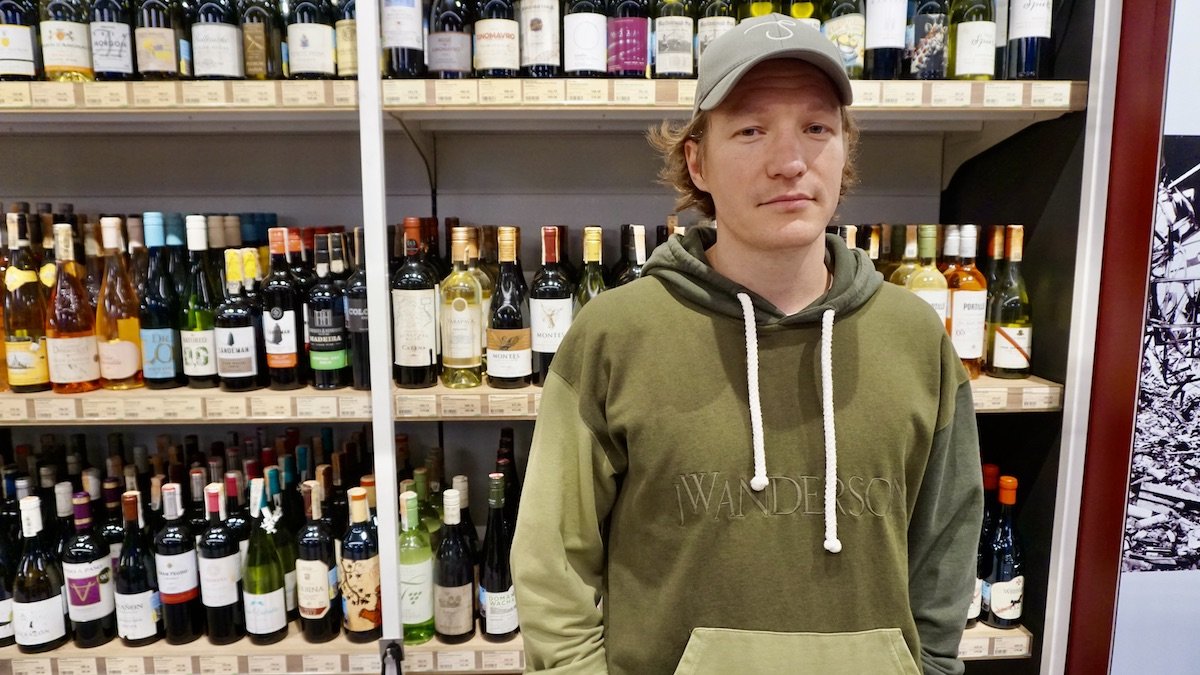
Roman Remeev, the head sommelier for central Kyiv's Goodwine grocery store, stands in front of shelves of survived wines. Photo by Nolan Peterson/Coffee or Die.
KYIV, Ukraine —
As soon as he heard the explosions, Roman Remeev reached for his phone. He sent a Telegram message to his co-workers, asking whether everyone was okay. It was his standard “chat check” — something the 30-year-old head sommelier at Kyiv’s Goodwine store did every time Russia attacked. He texted his team and waited.
During the morning of Oct. 17, Russia attacked downtown Kyiv with a barrage of Iranian-made Shahed-136 kamikaze drones. Judging by the closeness of the explosions, it was clear to Remeev that some drones hit their marks. Exactly one week earlier, Russian missiles had pummeled central Kyiv, shattering the fragile, citywide calm that had held for months. Remeev was frightened at first, yet by Oct. 17 he’d already adopted a “fatalistic” attitude about the risk of random death from a Russian missile or drone. “Unfortunately, it’s just math,” he later explained. “If it’s my time, it’s my time.”
The minutes passed, and Remeev’s co-workers checked in until only one remained unaccounted for: a 34-year-old sommelier named Viktoria Zamchenko. Growing concerned, Remeev sent Zamchenko another message. She didn’t respond. Then he texted her husband, Bohdan. There was no reply.
Remeev saw that Zamchenko had been active on Telegram around the time of the drone attack. For a moment, he felt optimistic, entertaining hope that there was some benign reason for her silence. By that time, images had already appeared on social media, showing the apartment building in central Kyiv where one Russian drone had hit. Remeev didn't recognize the place, but a co-worker remarked that it looked a lot like Zamchenko’s address.
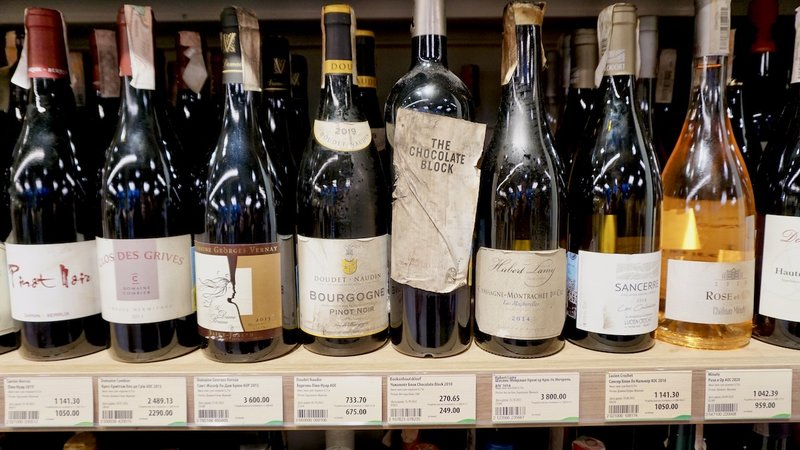
Survived wines for sale at Kyiv's Goodwine grocery store in October 2022. Photo by Nolan Peterson/Coffee or Die.
Goodwine is Kyiv’s premier gourmet grocery store. On this day in late October, the place is packed. There hasn’t been an air raid alert for a few hours, and many people are out running errands before the sirens sound again. The city doesn’t exactly screech to a halt during air raid alerts, but it’s definitely harder to get things done. Intermittent blackouts are also common, further complicating life’s daily routines. Even so, Kyiv’s citizens, like all Ukrainians, have already adapted to these new trials of Russia’s war. “It’s like a habit already,” Remeev told me during an interview at the Goodwine store in central Kyiv.
On the day we met, Remeev wore a baseball cap and sweats. He apologized about the hat. The power in his apartment had been out all morning, he explained, and there wasn’t time to dry his hair. He smiled and shrugged his shoulders. “You know how it is,” he said. “We need to be strong, and understand that everything will be all right. If we lose electricity, we can handle it.”
We sat in Goodwine’s swank, gourmet cafe, and I noted how crowded the store was. In normal circumstances, a busy grocery store on a weekday evening isn’t worth mentioning. But in the midst of Russia’s missile and drone terror campaign, and with Ukraine’s national power grid under assault, ordinary habits of everyday life have transformed into acts of resistance. These days, even an intact bottle of wine can embody Ukraine’s defiant spirit. In fact, that's one of the reasons why I asked to interview Remeev.
Near Goodwine’s front entrance stands a row of shelves stocked with wine. Some of the bottles bear scraped glass and burnt labels. Others look untouched. The wines widely vary in origin, age, and quality, but all the bottles have one key trait in common — they miraculously survived a March 3 Russian missile strike on Goodwine’s warehouse outside of Kyiv. The building held 1.5 million bottles of wine, and only “a few dozen thousand” survived the strike and ensuing fire, Remeev told me. Altogether, the warehouse's destruction cost Goodwine at least $15 million in lost products.
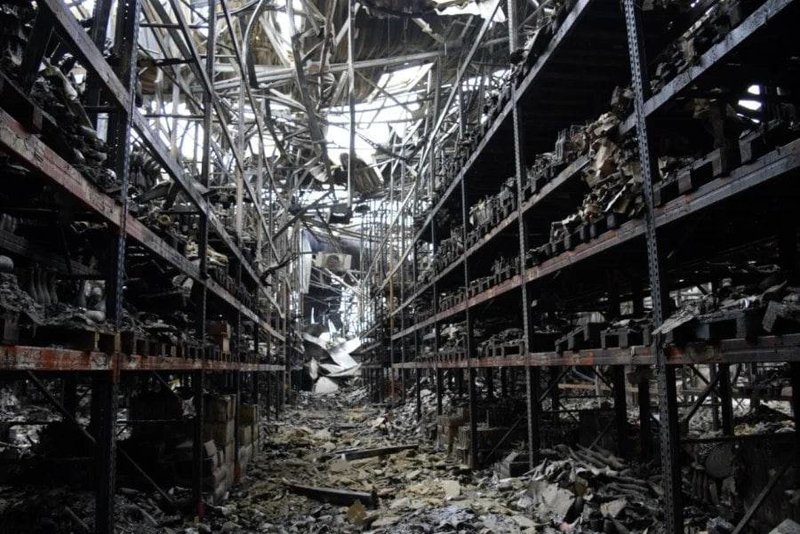
The interior of Goodwine's destroyed warehouse on the outskirts of Kyiv. Photo via Hromadske/Twitter.
The warehouse sat behind the front lines of Moscow’s ill-fated attack on Kyiv. So it wasn’t until the beginning of April, after Russian forces had retreated from northern Ukraine, that a group of Goodwine employees was finally able to survey the damage. At first, it looked absolute. Fire had consumed the warehouse, which also housed cosmetics and pharmaceutical supplies. Yet closer inspection revealed a glimmer of good news. Not all the wine was lost.
During the summer, Goodwine workers sifted through the piles of burnt debris and broken glass to find the few lucky bottles — about 2% of the total number — that had survived the fire. Remeev and his team cleaned and examined each recovered bottle. They threw away the heavily damaged ones, especially those with dislodged or damaged corks, since the wine inside was probably undrinkable. They prepped the remainder for purchase.
Ranging in price from $3 to about $800, the “survived” wines were an immediate hit. About half of the bottles have already been sold, and part of the revenue goes toward supporting the Ukrainian army.
“They became a symbol,” Remeev said. “I know a lot of people who bought a bottle to hang on to and open when we win the war.”
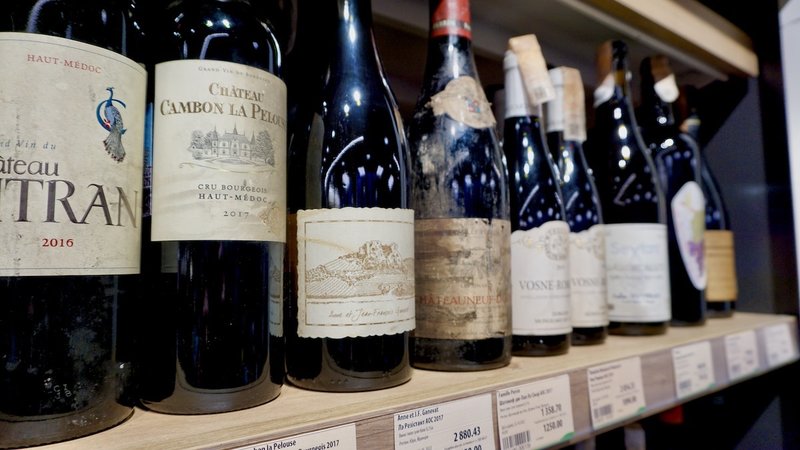
Survived wine for sale at central Kyiv's Goodwine grocery store in October 2022. Photo by Nolan Peterson/Coffee or Die.
Now Remeev was worried. He wondered whether this was truly happening. The situation seemed fictitious, too terrible to be real. In a city of millions, could Zamchenko really be among the handful who’d died that day?
Remeev asked one of Goodwine’s security guards to visit Zamchenko’s address. Once there, the guard confirmed that her building was hit. Then an investigator called Remeev and asked a series of questions.
Did Zamchenko have a cat?
Yes, Remeev replied.
Did she wear a wedding band?
Remeev thought a moment and remembered that Zamchenko had lost her ring while throwing out the trash at work a few weeks earlier. No, he replied, and then he described the kind of ring that Zamchenko’s husband wore.
The call ended. A few moments later, Remeev got the “worst news” he’d ever heard.
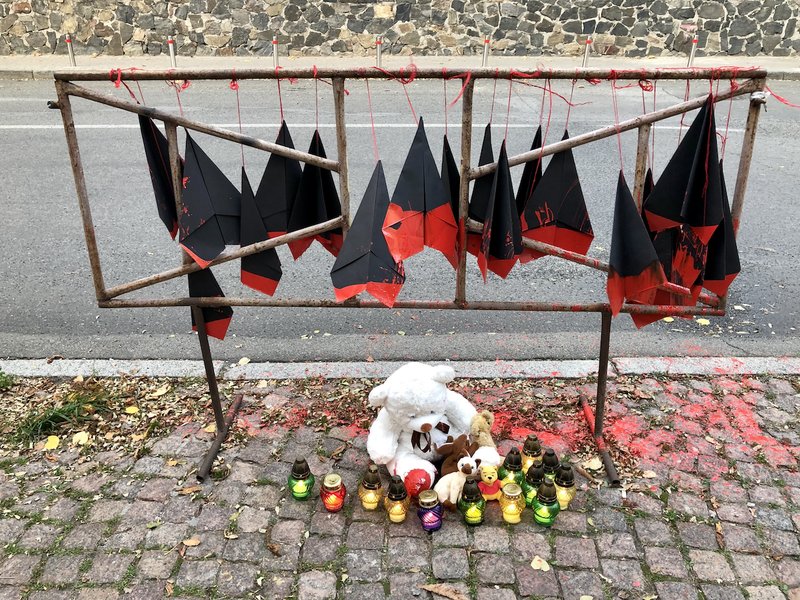
A display left by protesters outside the Iranian embassy in Kyiv on Oct. 18, 2022. Photo by Nolan Peterson/Coffee or Die.
After the full-scale war began in February, Zamchenko and her husband evacuated to Rivne, in western Ukraine. They'd been saving up to buy an apartment in Kyiv, but the war drove them to buy a car instead. They'd had no way to independently evacuate Kyiv when the invasion began, and Zamchenko had hated feeling so helpless. “Next time, I don’t want to rely on anybody,” she told Remeev.
As the only woman on Goodwine’s sommelier team, Zamchenko held herself to strict standards. She worked hard to improve her English and continued her professional education — she dreamed of becoming Ukraine’s first female master of wine, one of the highest honors a sommelier can achieve. Rather than ask for help, Zamchenko moved around heavy boxes of wine no differently from her male colleagues — that habit, among many others, constantly impressed Remeev. “She didn’t want to be treated differently,” he said. “She wanted to be everybody’s equal.”
On March 8, less than two weeks after the full-scale war began, Zamchenko wrote on Facebook: "None of us knows what will happen next...And even if we never meet again, Goodwine will forever remain something almost sacred to each of us."
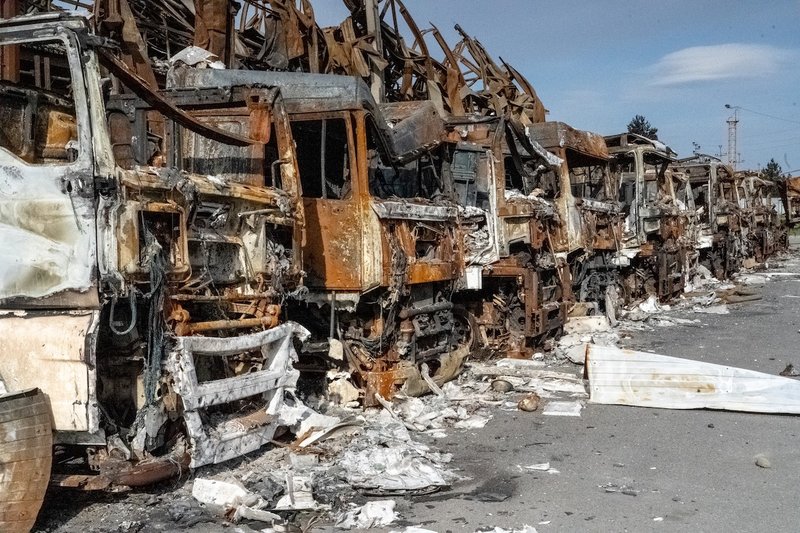
Catastrophic damage at Goodwine's warehouse, which a Russian missile struck on March 3. Photo by Nolan Peterson/Coffee or Die.
When Zamchenko and her husband returned to Kyiv in July, they already knew she was pregnant. The couple moved into an apartment on Zhylianska Street, and Zamchenko went back to work at Goodwine. Remeev recalled Zamchenko’s practically apologetic demeanor when she first revealed she was expecting. She’d already been away for a few months and made it clear that she didn’t want to quit her job. Her plan was to work until mid-December, although she felt embarrassed that she wouldn’t be able to help out during the winter holidays.
For his part, Remeev was just glad to have his friend back. And as a father himself, he was thrilled by her news. Six years earlier, when they were both “newbies” at Goodwine, they’d instantly bonded over the fact that they’d come from small villages and had worked their way upward into successful careers. Having experienced somewhat spartan childhoods, they were both determined to endure Russia’s power-grid attacks. During the war, Zamchenko had adopted a mantra, a kind of catchphrase to keep things in perspective. When times got tough, she proclaimed, "We need to complain less." Even so, Zamchenko considered moving away again after the Oct. 10 missile attack in Kyiv.
“We had a deep connection,” Remeev said. “We talked a lot about whether our families should stay in Kyiv or not.”
Viktoria and Bohdan Zamchenko died in each other’s arms with their cat beside them, their bodies buried in the rubble of their apartment on Zhylianska Street. They were both 34 years old, and she was six months pregnant. They were among the five civilians killed in Kyiv by Russia’s drone attack on Oct. 17.
After he got the call, Remeev broke the news to his co-workers. In the hours that followed, he kept busy. He immediately began to raise money for the Zamchenkos' parents and helped plan the funerals. It wasn’t until the first flurry of activity abated that he finally felt the cold sting of his friend's death.
“I was slightly destroyed,” he said. “For everybody, it was complicated.”
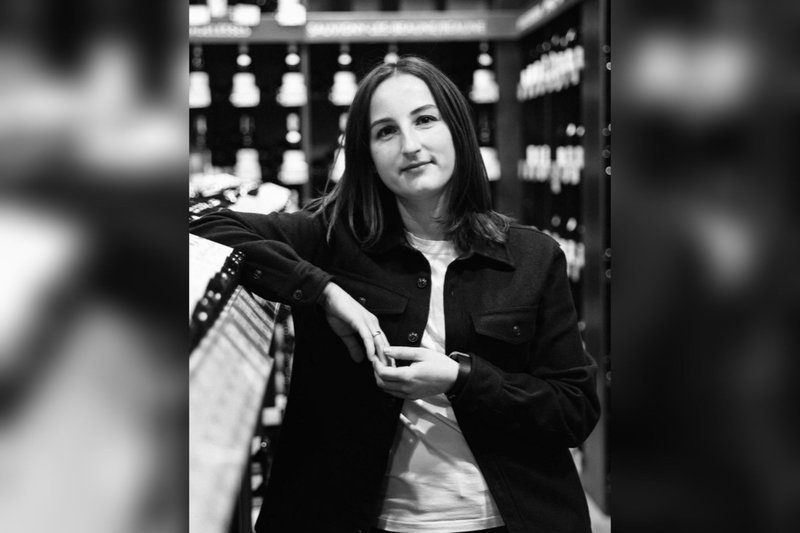
Viktoria Zamchenko, 34, was the only female sommelier at Kyiv's Goodwine store. Photo courtesy Goodwine.
On its veneer, life in Kyiv looks relatively normal. But scratch beneath the surface, and you see how the war has upheaved most people’s lives. In Remeev’s case, his wife and two children left Ukraine for Germany when the full-scale war began. Remeev, who stayed in Kyiv, has seen his family only once since the end of February. The visit lasted for one week and left him “emotionally starving” to see them again.
The Oct. 10 missile strikes spurred Remeev to turn his building’s basement into a bomb shelter. He brought down a chair and a floor mat and some books. When the sirens sounded, he dutifully descended to his underground den and waited until the all-clear signal. “It was super scary because we were pretty relaxed at that time,” he said. Yet, the constant cycle of subterranean sheltering became unlivable after a few days — especially since the other guy who often used the space had a habit of snoring. Even after Zamchenko’s death, Remeev no longer descends to the bomb shelter during air raid alerts. “I decided I can’t live like this,” he said.
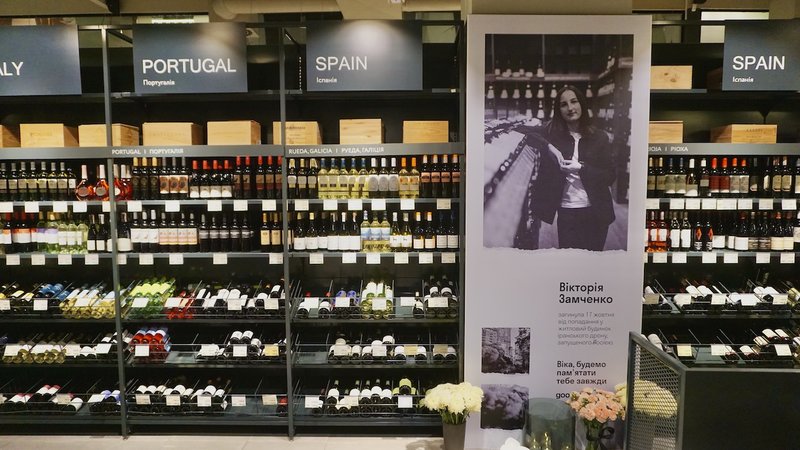
A memorial for Vitkoria Zamchenko at Goodwine in central Kyiv in October 2022. Photo by Nolan Peterson/Coffee or Die.
The day after the fatal drone strike, Remeev accompanied Bohdan and Viktoria’s mothers as they purchased the last clothes their children would ever wear. On the third day, according to custom, the bodies were buried. By the following weekend, Remeev was back at his apartment in Kyiv. Alone at last, he had time to confront his heartache.
That weekend, he never went outside. He ordered delivery for every meal, worked on a Lego set, read, and watched TV. He wondered why this was all happening. What was the reason for so much suffering? The days passed, and when his pain receded enough to rescind his need for solitude, Remeev missed his family more than ever. They’d planned on returning to Kyiv in November. The shock of Zamchenko’s death led them to postpone their homecoming for at least a month. Expecting a hard wartime winter, Remeev has looked into buying a dacha — a country home — outside of Kyiv with a wood oven and a gas-powered generator.
“It’s not the perfect time for them to come back, and it’s super complicated,” Remeev said. He then paused, thought about something, and smiled. “But as Vika said, ‘We need to complain less.’”
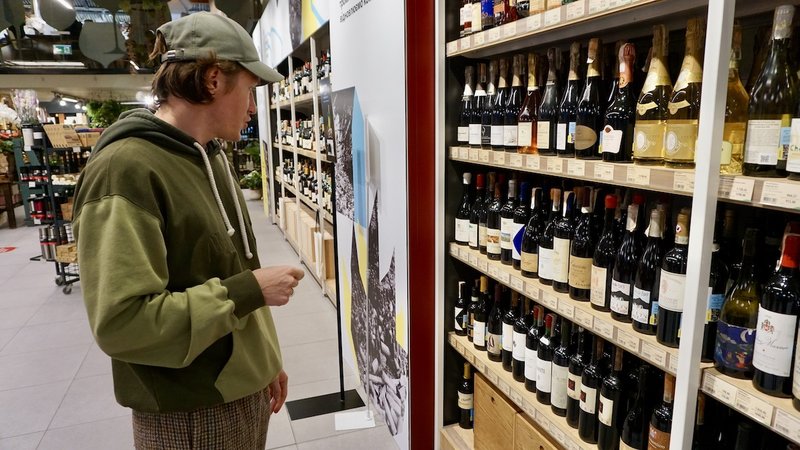
Roman Remeev helps the author chose a bottle of survived wine at central Kyiv' Goodwine store in October 2022. Photo by Nolan Peterson/Coffee or Die.
At the end of our conversation, Remeev showed me the memorial his team had made for Zamchenko. It’s in the middle of the wine section, and her co-workers put fresh flowers in front of her picture every day. In December, Goodwine plans to do a special display with Zamchenko’s top 10 wines.
Before we parted, I told Remeev I wanted to buy a bottle of survived wine for my parents, as well as a bottle for my wife and me. Something for us to open after Ukraine wins the war, I explained. Remeev led me to the survived wines and carefully looked them over. With a sommelier’s expert knowledge, he queried my tastes and explained the characteristics of several wines. He made a few suggestions, then added, “If you want the wine to taste okay, choose a bottle that isn’t damaged. If you just want an artifact, well, then it doesn’t matter.”
I chose two very damaged bottles.
When I left, it was already dark. The street lights were off, and I used my iPhone’s flashlight to find my way along the sidewalk. I strained to see ahead and noticed a few fellow silhouettes in the murk. The narrow light beams projecting from their smartphones pulsed past me to the time of their steps. Farther on I walked by cafes and coffee shops illuminated from within by candlelight. The wavering little flames cast enough light to see the shapes of people inside, even hints of their faces.
Despite all the darkness that Russia’s war has wrought, life carries on in this city of survivors.
Read Next: Ukraine’s Air Defenses Rebuff Russian Missile and Drone Attack

BRCC and Bad Moon Print Press team up for an exclusive, limited-edition T-shirt design!
BRCC partners with Team Room Design for an exclusive T-shirt release!
Thirty Seconds Out has partnered with BRCC for an exclusive shirt design invoking the God of Winter.
Lucas O'Hara of Grizzly Forge has teamed up with BRCC for a badass, exclusive Shirt Club T-shirt design featuring his most popular knife and tiomahawk.
Coffee or Die sits down with one of the graphic designers behind Black Rifle Coffee's signature look and vibe.
Biden will award the Medal of Honor to a Vietnam War Army helicopter pilot who risked his life to save a reconnaissance team from almost certain death.
Ever wonder how much Jack Mandaville would f*ck sh*t up if he went back in time? The American Revolution didn't even see him coming.
A nearly 200-year-old West Point time capsule that at first appeared to yield little more than dust contains hidden treasure, the US Military Academy said.












